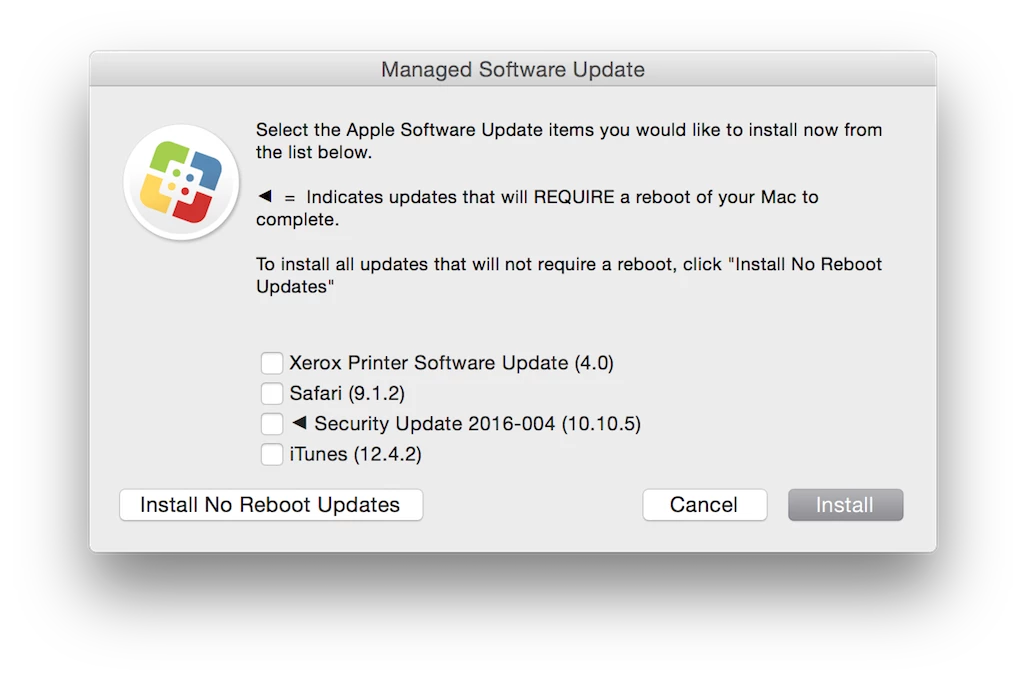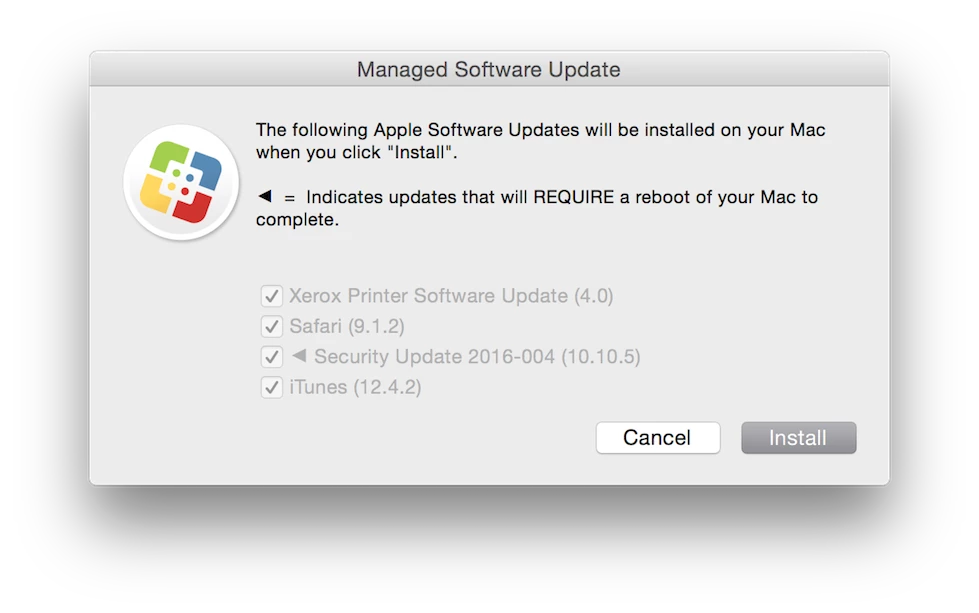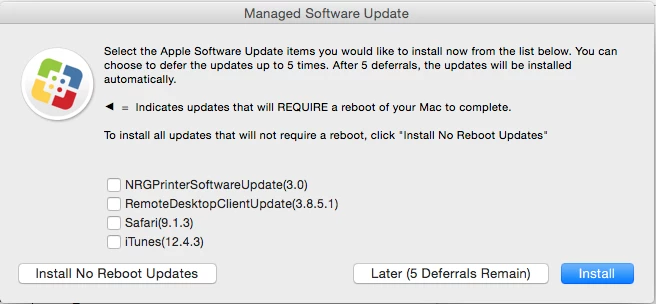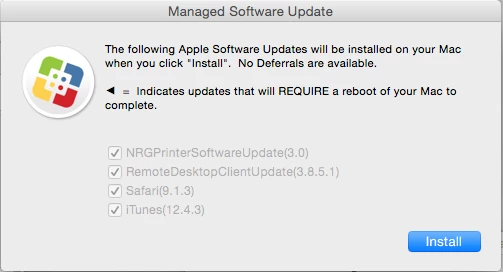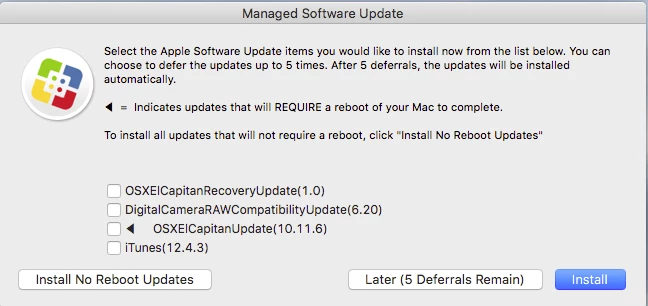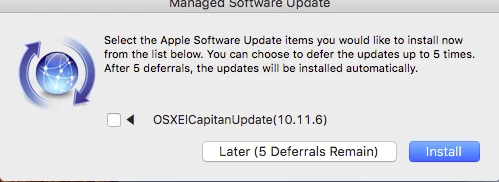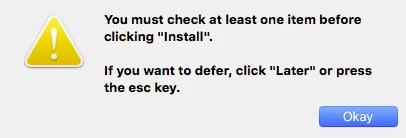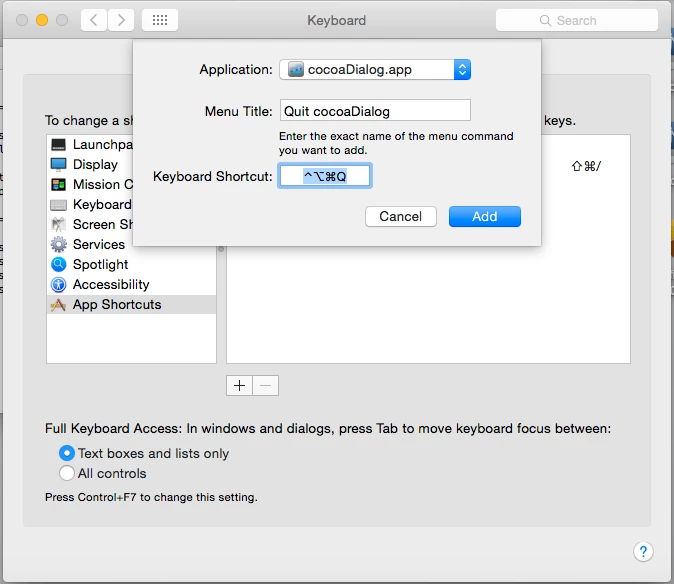Hey John, I went a few steps further and added some logic into the script to count how many times the user chooses no before the script runs automatically anyway. To me, it gives the user a greater sense of control even if only perceived.
#!/bin/sh
fRunUpdates ()
{
## Once the user OKs the updates or they run automatically, reset the timer to 5
echo "5" > /Library/Application Support/JAMF/.SoftwareUpdateTimer.txt
/Library/Application Support/JAMF/bin/jamfHelper.app/Contents/MacOS/jamfHelper -windowType hud -lockhud -heading 'ISD is updating software on your computer' -description 'We are now updating your Mac System software. These updates should not take longer than 30 to 45 minutes depending on how many updates your Mac needs. If you see this screen for more than 45 minutes please call our Service Desk at X4949. Please do not turn off this computer. This message will go away when updates are complete.' -icon /Library/Application Support/JAMF/EndUserSupport/AGRose.icns > /dev/null 2>&1 &
## We'll need the pid of jamfHelper to kill it once the updates are complete
JHPID=`echo "$!"`
/usr/sbin/jamf policy -trigger SoftwareUpdate &
## Get the Process ID of the last command run in the background ($!) and wait for it to complete (wait)
SUPID=`echo "$!"`
wait $SUPID
## kill the jamfHelper. If a restart is needed, the user will be prompted. If not the hud will just go away
kill -s KILL $JHPID
exit 0
}
######### Set variables for the script ############
########## Get the group membership for the client #####################
## Get MAC Address using networksetup
MAC=$( networksetup -getmacaddress en0 | awk '{ print $3 }' | sed 's/:/./g' )
## Use the JSS API to get the Mac's group memberships
JSSGroups=$( curl -s -u username:password https://<casper server>:8443/JSSResource/computers/macaddress/$MAC
| xpath //computer/groups_accounts/computer_group_memberships[1]
| sed -e 's/<computer_group_memberships>//g;s/</computer_group_memberships>//g;s/<group>//g;s/</group>/
/g' )
## Set up the software update time if it does not exist already
if [ ! -e /Library/Application Support/JAMF/.SoftwareUpdateTimer.txt ]; then
echo "5" > /Library/Application Support/JAMF/.SoftwareUpdateTimer.txt
fi
## Get the timer value
Timer=`cat /Library/Application Support/JAMF/.SoftwareUpdateTimer.txt`
## Get the currently logged in user, if any. Also check for updates that require a restart and ones that do not.
UpdatesNoRestart=`softwareupdate -l | grep recommended | grep -v restart`
RestartRequired=`softwareupdate -l | grep restart | grep -v '*' | cut -d , -f 1`
LoggedInUser=`who | grep console | awk '{print $1}'`
################ End Variable Set ################
## Use echo and grep to find known-core (non system) software update groups. If these groups are found, run these installers silently since no restarts are required for these updates. Use an array to see which updates we take account of. The names of the array elements are also trigger names for each update. This way when there's a new software package to keep updated, we add the trigger name into the array, and the update policy to the JSS. Casper does the rest
NonSysCore=( 'SoftwareUplift-FlashPlayer' 'SoftwareUplift-Flip4Mac' 'SoftwareUplift-FontNuke' 'SoftwareUplift-PrintWindow' 'SoftwareUplift-MicrosoftOffice' 'SoftwareUplift-MicrosoftOutlook' )
for (( i = 0; i < ${#NonSysCore[@]}; i++ ))
do
CheckUpdate=`echo "$JSSGroups" | grep "${NonSysCore[$i]}"`
if [ "$CheckUpdate" != "" ]; then
jamf policy -trigger "${NonSysCore[$i]}"
fi
done
## If there are no system updates, quit
if [ "$UpdatesNoRestart" == "" -a "$RestartRequired" == "" ]; then
echo "No updates at this time"
exit 0
fi
## If we get to this point and beyond, there are updates.
## if there is no one logged in, just run the updates
if [ "$LoggedInUser" == "" ]; then
/usr/sbin/jamf policy -trigger SoftwareUpdate
else
## someone is logged in. prompt if any updates require a restart ONLY IF the update timer has not reached zero
if [ "$RestartRequired" != "" ]; then
## If someone is logged in and they have not canceled 5 times already, prompt them to install updates that require a restart and state how many more times they can press 'cancel' before updates run automatically.
if [ $Timer -gt 0 ]; then
HELPER=`/Library/Application Support/JAMF/bin/jamfHelper.app/Contents/MacOS/jamfHelper -windowType utility -icon /Library/Application Support/JAMF/EndUserSupport/AGRose.icns -heading "AG ISD Approved Software Updates are Available for Your Mac" -description "These updates will require you to restart your Mac. If you would like to install these now, click 'Install Updates.' If you would not like to install now, click 'Cancel Updates.' You may choose not to install updates $Timer more times before this computer will automatically install them. These updates require a restart of your Mac: $RestartRequired" -button1 "Install Updates" -button2 "Cancel Updates" -cancelButton "2" -defaultButton 2 -timeout 60`
echo "jamf helper result was $HELPER";
## If they click Install Updates then run the updates
if [ "$HELPER" == "0" ]; then
fRunUpdates
else
## If no, then reduce the timer by 1. The script will run again the next day
let CurrTimer=$Timer-1
echo "user chose No"
echo "$CurrTimer" > /Library/Application Support/JAMF/.SoftwareUpdateTimer.txt
exit 1
fi
else
## If Timer is already 0, run the updates automatically, the user has been warned!
fRunUpdates
fi
fi
fi
## Install updates that do not require a restart
if [ "$UpdatesNoRestart" != "" ]; then
/usr/sbin/jamf policy -trigger SoftwareUpdate
fi




